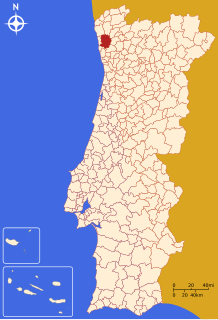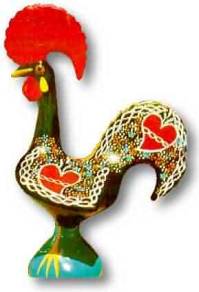Barcelos, Portugal
Barcelos | |
|---|---|
|
Top: The entrance to the city of Barcelos coming from the parish of Barcelinhos; middle: Igreja Matriz de Barcelos; City Hall and statue of Bishop António Barroso; bottom: The medieval tower; Tower view of the Church of Bom Jesus da Cruz and the gardens | |
 | |
| Coordinates: 41°31′N 8°37′W / 41.517°N 8.617°W | |
| Country | |
| Region | Norte |
| Intermunic. comm. | Cávado |
| District | Braga |
| Parishes | 60 |
| Government | |
| • President | Mário Constantino Lopes (PSD) |
| Area | |
• Total | 378.90 km2 (146.29 sq mi) |
| Population (2011) | |
• Total | 120,391 |
| • Density | 320/km2 (820/sq mi) |
| Time zone | UTC+00:00 (WET) |
| • Summer (DST) | UTC+01:00 (WEST) |
| Website | http://www.cm-barcelos.pt |
Barcelos (Portuguese pronunciation: [bɐɾˈsɛluʃ] ⓘ) is a city and a municipality in Braga District in the Minho Province, in the north of Portugal. The population in 2011 was 120,391,[1] in an area of 378.90 km2.[2] With 60 parishes, it is the municipality with the highest number of parishes in the country. It is one of the growing municipalities in the country, and is well known for its textile and adobe industries, as well as its horseback riding events and "figurado" style of pottery, which are comical figurines with accentuated features of farmers, folk musicians, and nativity scene characters.
Barcelos is part of the UNESCO Creative Cities Network as a Crafts and Folk Art City.[3]
History
[edit]Originally a Roman settlement, it expanded and became the seat of the First Duke of Bragança in the 15th century. The palace of the Dukes of Bragança was destroyed by an earthquake in 1755 and is now an open-air museum.
The town is on the Portuguese Way, a Christian pilgrimage route connecting to the Camino de Santiago.
Construction of the Barcelos Bridge, crossing the Cávado River, dates to 1325. The Bridge was deemed a National Monument in 1910.
Rooster
[edit]
The town is closely associated with the Rooster of Barcelos (Portuguese: o galo de Barcelos), which often serves as a national symbol of Portugal.
One of the many legends of the rooster involves the town's long history along a pilgrimage route. The story involves a wealthy man throwing a grand party, which ended after the silver had gone missing. Among the guests was a pilgrim, who was accused of theft, and pleaded innocence before a judge. Unswayed by the pilgrim's claims, the judge sentenced the pilgrim to be hanged. As final protest, the pilgrim invoked divine intercession: the rooster being prepared for the judge's dinner would crow three times as proof of his innocence. As the execution approached, the judge at his dinner table watched the roasted bird miraculously crow three times. The judge quickly released the pilgrim, who would later return to Barcelos and commission a statue commemorating the divine providence.
Climate
[edit]Barcelos has a Mediterranean climate (Köppen: Csb) with warm summers and very wet, mild winters.
| Climate data for Barcelos, 1985-2021, altitude: 36 m (118 ft) | |||||||||||||
|---|---|---|---|---|---|---|---|---|---|---|---|---|---|
| Month | Jan | Feb | Mar | Apr | May | Jun | Jul | Aug | Sep | Oct | Nov | Dec | Year |
| Daily mean °C (°F) | 9.0 (48.2) |
9.9 (49.8) |
12.0 (53.6) |
13.3 (55.9) |
16.1 (61.0) |
18.8 (65.8) |
20.7 (69.3) |
20.5 (68.9) |
19.0 (66.2) |
15.9 (60.6) |
12.0 (53.6) |
9.9 (49.8) |
14.8 (58.6) |
| Average precipitation mm (inches) | 175.0 (6.89) |
138.1 (5.44) |
116.7 (4.59) |
125.9 (4.96) |
88.3 (3.48) |
40.9 (1.61) |
25.2 (0.99) |
28.0 (1.10) |
67.1 (2.64) |
178.2 (7.02) |
185.9 (7.32) |
182.8 (7.20) |
1,352.1 (53.24) |
| Source: Portuguese Environment Agency[4] | |||||||||||||
Parishes
[edit]Administratively, the municipality is divided into 61 civil parishes (freguesias):[5]
- Abade de Neiva
- Aborim
- Adães
- Airó
- Aldreu
- Alheira e Igreja Nova
- Alvelos
- Alvito (São Pedro e São Martinho) e Couto
- Arcozelo
- Areias
- Areias de Vilar e Encourados
- Balugães
- Barcelinhos
- Barcelos, Vila Boa e Vila Frescainha (São Martinho e São Pedro)
- Barqueiros
- Cambeses
- Campo e Tamel (São Pedro Fins)
- Carapeços
- Carreira e Fonte Coberta
- Carvalhal
- Carvalhas
- Chorente, Góios, Courel, Pedra Furada e Gueral
- Cossourado
- Creixomil e Mariz
- Cristelo
- Durrães e Tregosa
- Fornelos
- Fragoso
- Galegos (Santa Maria)
- Galegos (São Martinho)
- Gamil e Midões
- Gilmonde
- Lama
- Lijó
- Macieira de Rates
- Manhente
- Martim
- Milhazes, Vilar de Figos e Faria
- Moure
- Negreiros e Chavão
- Oliveira
- Palme
- Panque
- Paradela
- Pereira
- Perelhal
- Pousa
- Quintiães e Aguiar
- Remelhe
- Rio Covo (Santa Eugénia)
- Roriz
- Sequeade e Bastuço (São João e Santo Estêvão)
- Silva
- Silveiros e Rio Covo (Santa Eulália)
- Tamel (Santa Leocádia) e Vilar do Monte
- Tamel (São Veríssimo)
- Ucha
- Várzea
- Viatodos, Grimancelos, Minhotães e Monte de Fralães
- Vila Cova e Feitos
- Vila Seca
Notable citizens
[edit]
- Paio Peres Correia (ca.1205-1275) a Reconquista warrior from Monte de Fralães.
- João Garcia de Guilhade, (PT Wiki) (1239-1288) a famous trobadour from Milhazes.
- Pedro Afonso, Count of Barcelos (1289–1350) illegitimate son of King Denis of Portugal and the third Count of Barcelos.
- Isabel of Barcelos (1402–1466) a lady of the Portuguese nobility
- Lourenço de Almeida (ca.1480-1508) an explorer from Martim and military commander.
- Gaspar de Faria (ca.1520 — 1576), was the 6th Bishop of Angra, from 1571 and 1576.
- Francisco de Sá Carneiro (1934–1980) Prime Minister of Portugal; his paternal family were from Barcelos.
- António Pires de Lima, (PT Wiki) (1936-2017) a lawyer from Barcelos.[6]
- Gisela João (born 1983) a Portuguese fado singer.
- Renata Gomes (born 1985) a cardiovascular specialist and academic

Sport
[edit]- Dito (1962–2020) a footballer with 383 club caps and 17 with Portugal
- Capucho (born 1972) a former footballer with 410 club caps and 34 with Portugal
- Bruno Magalhães (born 1982) a former footballer with 443 club caps
- Hugo Viana (born 1983) a footballer with 321 club caps and 29 with Portugal
- Nélson Oliveira (born 1991) a footballer with over 270 club caps and 17 with Portugal
Sport
[edit]Barcelos is home to Gil Vicente Futebol Clube (football) and Óquei Clube de Barcelos (rink hockey).
Twin Cities
[edit] Vierzon, France
Vierzon, France Pontevedra, Spain
Pontevedra, Spain São Domingos, Cape Verde
São Domingos, Cape Verde El Jadida, Morocco
El Jadida, Morocco Recife, Brazil
Recife, Brazil Svishtov, Bulgaria
Svishtov, Bulgaria
References
[edit]- ^ Instituto Nacional de Estatística
- ^ Eurostat Archived October 7, 2012, at the Wayback Machine
- ^ "Barcelos | Creative Cities Network". en.unesco.org. Retrieved 2018-10-03.
- ^ "Barcelos (04F/01C)". APA. Retrieved 22 October 2021.
- ^ Diário da República. "Law nr. 11-A/2013, pages 552 21-24" (PDF) (in Portuguese). Retrieved 17 July 2014.
- ^ Ordem dos Advogados Archived March 3, 2012, at the Wayback Machine







